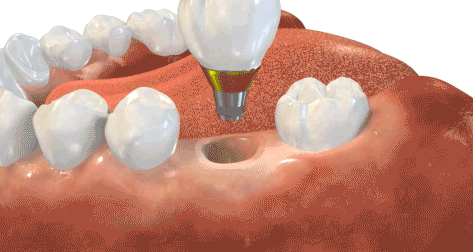

Dental Plaque Comprises Over 300 Bacteria
Dental implants are a type of prosthetic device used to replace missing teeth. They are made up of a metal post or frame that is surgically placed into the jawbone, and a replacement tooth or crown that is attached to the post or frame.
Dental implants are a permanent solution to missing teeth, and they can be used to replace single teeth, multiple teeth, or even an entire arch of teeth.
It can also be used to support a bridge or denture, making them a versatile and effective treatment option for many people. With proper care and maintenance, it can last a lifetime.
Aside from the cosmetic side of things, It can also help in maintaining your oral health. Missing teeth can cause bone loss beneath the gums, and cause surrounding teeth to shift as well. They promote bone growth and prevent the surrounding teeth from potentially misaligning.
It’s an excellent solution for those who have lost teeth due to injury, disease, or decay.
They are a safe, effective, and long-lasting way to replace missing teeth and restore a natural-looking smile. Implants are surgically placed into the jawbone and act as a strong foundation for replacement teeth.
With proper care, they can last a lifetime and provide a secure and beautiful smile. We highly approve of it as a reliable and aesthetically pleasing solution for missing teeth.
Indications of Dental Implants
Dental implants are a reliable and approved solution for those who are seeking a permanent replacement for missing teeth. This innovative dental technology has been used for decades and has proven to be a safe and effective way to restore smiles.
Dental implants are a great option for those who want to maintain a natural look and feel, as they are designed to look and function like natural teeth. Furthermore, they are a long-term solution, as they can last a lifetime with proper care.
With the help of a qualified dentist, dental implants can be a great way to restore your smile and improve your oral health.
Contra-Indications of Dental Implants
Dental implants are a safe and effective treatment option for many patients with missing teeth. However, there are some cases in which dental implants are not recommended. These cases include patients with uncontrolled diabetes, periodontal disease, and poor oral hygiene.
Additionally, individuals with a weakened immune system, such as those undergoing chemotherapy, may not be suitable candidates.
Despite these contraindications, It remains a viable option for many patients, offering a secure and long-lasting solution for missing teeth. We are in full approval of the use of a reliable treatment option.
Dental Implants is Safe
Dental implants are a safe and effective way to replace missing teeth and restore oral health. The risks associated with it are minimal, and the benefits far outweigh any potential issues.
With proper care and maintenance, dental implants can last a lifetime and provide a strong, secure foundation for a beautiful smile. The success rate is extremely high, and the procedure is safe and reliable.
Therefore, it is clear that it’s an excellent choice for those looking to restore their smile and oral health

Benefits of Dental Implants
Dental implants are a highly beneficial form of tooth replacement, providing a permanent solution to missing teeth. They can improve the appearance of a patient’s smile, as well as their confidence and self-esteem.
Furthermore, it can help to restore the ability to speak and eat properly, as well as improve the overall health of the mouth. They are also designed to last a lifetime, making them a cost-effective solution in the long run.
Overall, they are a great choice for anyone looking for a secure and reliable way to replace missing teeth. We highly recommend them as an excellent option for tooth replacement.
A. Replica to natural teeth.
B. Makes Speech easier
C. Functions like natural teeth
D. Lasts lifelong
E. Maintains facial Aesthetics
F. No adjacent teeth support is required
G. Prevents bone loss
H. No removal and cleaning are required.
